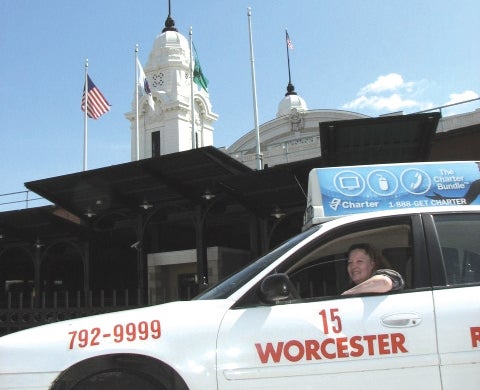Jennifer McGinty, a driver with Red Cab of Worcester Inc., has been behind the wheel of a taxi for a couple of years, and she knows it always gets slow in the summer, when colleges are out and more people walk where they want to go.
Even though it’s just only spring and the college kids are still in town, McGinty says it’s already getting slow.
“It’s bad out here,” she said, sitting in her taxi outside Union Station in the hopes that a passenger will show up.
Increased Competition
McGinty predicts it may be one of the worst summers in years. These days, she says, she spends more time in her cab trying to pick up a fare—frequently working from 4 a.m. to 7 p.m.
“You sleep and you drive,” she said.
McGinty and many other taxi drivers blame two things for the slowdown: the recession and the profusion of livery cars.
Liveries, many of which are driven by Spanish speakers and serve the city’s Latino population, are supposed to provide transportation by appointment only. But many in the cab business say they actually act as illegal taxis, allowing riders to flag them down or call them for immediate pick-up. And because they don’t need taxi licenses or pay the high insurance that cab owners do, they’re often perceived as having a big advantage.
“Their numbers seem to be getting larger by the day,” said Bill Clark, co-owner of Red Cab’s main competitor, Yellow Cab of Worcester Inc. “They’re growing because they have much less expense than we do.”
Of the 110 legal cabs in Worcester, Yellow Cab controls 53, acting as a dispatch and billing service for independent drivers. Red Cab has most of the rest of the market.
Clark, who’s been with the company for three decades, said his business is off about 30 percent from last year so far.
“It’s bleak,” he said. “I don’t think it’s ever been this bad.”
Advantage: Taxis
Yet in some ways the balance of power between the cabs and liveries has actually shifted in favor of the cabs over the last year.
Worcester Police Lt. Joseph D’Andrea notes that the city council passed new regulations last summer severely limiting how liveries can operate. Besides the restrictions on how they pick passengers up, they have to take payment with credit cards or checks—not cash—and they must charge fixed fee for short trips, not fares based on miles driven.
Before the new regulations were passed, D’Andrea said, the rules for liveries were unclear, and police couldn’t do much to limit their activities. Since then, cops have been running sting operations, issuing $100 tickets to liveries that respond immediately to calls from potential riders.
That’s led to complaints of harassment from livery owners and drivers, as well as advocates in the Latino community.
Juan Gomez, a former city councilor who has been outspoken in his support for livery operators, said there may be some renegade drivers behaving improperly, but the city’s two main livery companies, Ecua 2000 and New Worcester Limo, follow the rules. Still, he said, the companies face flak from police and politicians.
“It’s unfair and it’s unjust,” he said.
The two livery companies did not return calls for this story.
To D’Andrea, the greater scrutiny on liveries suggests that competition from those operations isn’t a big factor in the taxi market downturn.
“I think it’s probably the economy,” he said.
Clark, of Yellow Cab, agrees that the economy is a big factor in his company’s troubles. He said it’s not just individuals that have reduced their use of the service, but also corporate clients that sometimes use taxies to transport workers and visitors, and medical companies that need to shuttle patients into doctors’ offices or hospitals.
Clark said that, in response to the downturn, some drivers and cab owners have decided to get out of the business. But that’s hard for the owners in particular, he said, because there aren’t many buyers out there for the cars and licenses.
Meanwhile, McGinty said she has another concern about the economy: “My feeling is we’re going to get robbed more often.”
So far that hasn’t happened to her, and she has no plans to change her line of work soon. On the whole, she said, she likes driving and meeting people, even when she’s on the road for 15-hour days.
“It goes by fast,” she said.

